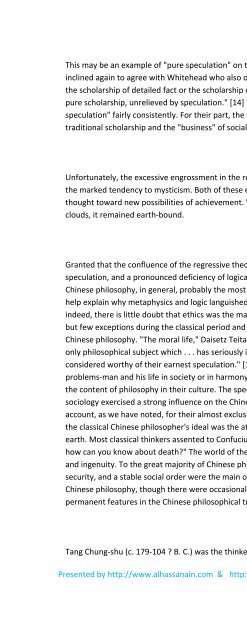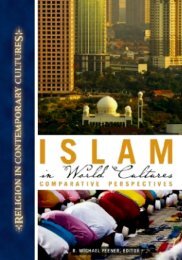- Page 2:
Committee Of Directors Preface Intr
- Page 6:
6. M. Abdul Hye, Vice‐Principal,
- Page 10:
In the end I have to note with grea
- Page 14:
customs, and mores. Each of these c
- Page 18:
determination of the life‐span of
- Page 22:
Idrisi; and such celebrated literar
- Page 26:
More‐over, in the account given o
- Page 30:
the same as Hegel's. But, according
- Page 34:
F The chief aim of this work is to
- Page 38:
considered indispensable for our wo
- Page 42:
excluded from the group of the Veda
- Page 46:
1. Celestial Gods‐ The oldest god
- Page 50:
Brahmanas (commentaries),and the Ar
- Page 54:
contain flashes of insight, yet the
- Page 58:
individual with the Universal Soul
- Page 62:
accommodate not only the gods of th
- Page 66:
The Carvaka is a non‐Vedic, mater
- Page 70:
converted to his viewpoint and in d
- Page 74:
interests including the intellectua
- Page 78:
contemplation, and silence have to
- Page 82: 2. The Yogacara School of Subjectiv
- Page 86: associated with matter is involved
- Page 90: Through meditation and self‐tortu
- Page 94: After creating the elements, Brahma
- Page 98: The first category by the name of p
- Page 102: Book 6 contains duties of the four
- Page 106: There was, however, no imposition o
- Page 110: [30] Zimmer, Philosophies of India,
- Page 114: Theism from the Vedic to the Mohamm
- Page 118: civilizations In developing their p
- Page 122: Taoism, as set forth in the Tao Te
- Page 126: structure of ethical and social rel
- Page 130: The Nameless is the origin of Heave
- Page 136: weight to be given to its philosoph
- Page 140: Primary Sources Fung Yu‐lan, A Hi
- Page 144: The almost insoluble problems raise
- Page 148: Righteousness), Vohu Manah (Good Th
- Page 152: hymns or legal and canonical texts
- Page 156: that, in Mazdaic thought, the Absol
- Page 160: In Mazdaic anthropology, according
- Page 164: We said that the Gathas do not ment
- Page 168: Mazdah in His choosing, "acting" as
- Page 172: 4. Time and Cycle With regard to th
- Page 176: order to avoid a possible destructi
- Page 180: school seems also to have shown a t
- Page 184:
[7] Bundahishn; I. 32. [8] Cf. Bund
- Page 188:
dell' Iran, Bologna, 1920; C. Barth
- Page 192:
GREEK PHILOSOPHY IN THE MAINLAND AN
- Page 196:
touch the same material substance t
- Page 200:
He is said to have visited Egypt an
- Page 204:
The way of opinion is the way of un
- Page 208:
impossible. Therefore there is no r
- Page 212:
ather a reflection of fire like tha
- Page 216:
The earth is flat and stays suspend
- Page 220:
It is flat but tilted downward towa
- Page 224:
Euripides produced their tragedies,
- Page 228:
From the purely philosophical point
- Page 232:
Opinions greatly differ in moral ma
- Page 236:
particulars. It is a gradual proces
- Page 240:
Creator, obeying the Father's order
- Page 244:
only hymns to the gods and praise o
- Page 248:
included in the community meals of
- Page 252:
The mental representations of the e
- Page 256:
There are things in existence that
- Page 260:
child or slave or poverty‐stricke
- Page 264:
polity in which the citizens are po
- Page 268:
did not like him and even beat him
- Page 272:
Epicurus identified happiness with
- Page 276:
[23] Ibid., VII, 7. [24] Metaphysic
- Page 280:
Rome, carrying their doctrines with
- Page 284:
The metaphysics of the Neo‐Pythag
- Page 288:
distinguished the world‐builder a
- Page 292:
while the former lifts you out of t
- Page 296:
Other schools outside Jewish circle
- Page 300:
sometimes the other and says things
- Page 304:
Plotinus has another way to explain
- Page 308:
intellectual world. Then there is f
- Page 312:
nevertheless exercised a potent inf
- Page 316:
Isagoge, the "Table of Porphyry," A
- Page 320:
and unable to support settled commu
- Page 324:
shippers, the god contenting himsel
- Page 328:
temple is said to have contained as
- Page 332:
and were seeking another more satis
- Page 336:
moral ideas, which may be briefly d
- Page 340:
were extending their sphere of infl
- Page 344:
understand. [15] These attributes a
- Page 348:
It is He who gives life and death a
- Page 352:
possessed of the highest excellence
- Page 356:
intellect is to know truth from err
- Page 360:
God reveals His signs not only in t
- Page 364:
[322] the earth shall be shaken to
- Page 368:
the righteous in the life hereafter
- Page 372:
[32] Ibid., xxiii, 91‐92. [33] Ib
- Page 376:
[72] Ibid., xx, 53. [73] Ibid., xli
- Page 380:
[112] Ibid., vi, 59. [113] Ibid., x
- Page 384:
[151] Ibid., xxxii, 7. [152] Ibid.,
- Page 388:
[191] Ibid., ii, 30. [192] Ibid., x
- Page 392:
[230] Ibid., iii, 137‐39. [231] I
- Page 396:
[265] Ibid., iii, 35‐37, 42‐51;
- Page 400:
[304] Ibid., iii, 145; xxi, 35 [305
- Page 404:
[343] Ibid., vi, 51. [344] Ibid., x
- Page 408:
As it has been explained in the pre
- Page 412:
[50] cover evil with pardon, [51] a
- Page 416:
Truth or Wisdom ‐ Wisdom as a hum
- Page 420:
elievers that they are compassionat
- Page 424:
Qur'an as unbecoming a true believe
- Page 428:
[274] to be arrogant against God, [
- Page 432:
Vice ‐ Against goodness the Qur'a
- Page 436:
[412] which benefits their own soul
- Page 440:
followed them, as they are all with
- Page 444:
[38] Ibid., ii, 143. [39] Ibid., vi
- Page 448:
[76] Ibid., xl, 51; x1vii, 7. [77]
- Page 452:
[116] Ibid., lviii, 11. [117] Ibid.
- Page 456:
[156] Ibid., ii, 28; iv, 144; v, 60
- Page 460:
[195] Ibid., iv, 117. [196] Ibid.,
- Page 464:
[235] Ibid., xe, 4. [236] Ibid., lx
- Page 468:
[275] Ibid., xliv, 19. [276] Ibid.,
- Page 472:
[315] Ibid., ii, 11. [316] Ibid., i
- Page 476:
[349] Qur'an, vii, 10; xxxvi, 45‐
- Page 480:
[389] Ibid., xi, 90. [390] Ibid., v
- Page 484:
[427] Qur'an, v,.96. [428] Ibid., x
- Page 488:
2. On the basis of the aforesaid tr
- Page 492:
It is sometimes tried to conclude f
- Page 496:
(j) "God has permitted trade and fo
- Page 500:
"You will never attain piety until
- Page 504:
[48] Zakat is not only for the good
- Page 508:
17. The Qur'anic rule with regard t
- Page 512:
"They ask you what they should spen
- Page 516:
precedents came into existence. But
- Page 520:
(c) The right to rule belongs to Go
- Page 524:
8. The powers of a true Caliphate d
- Page 528:
(b) The Qur'an does not give us any
- Page 532:
(c) They must give unstinted suppor
- Page 536:
purpose and a mission. It must posi
- Page 540:
[15] Qur'an, ii, 283. [16] Ibid., i
- Page 544:
[39] Ibid., ii, 195. [40] Ibid., v,
- Page 548:
[61] Qur'an, ix, 60. [62] Verses 7
- Page 552:
[93] Ibid., xlii, 38. [94] Ibid., i
- Page 556:
Sunan; ibn Majah, Sunan al‐Mustaf
- Page 560:
Now, from the basic beliefs of unit
- Page 564:
originated work of God and it came
- Page 568:
needless to ask for it, and if the
- Page 572:
SOME LEADING MU'TAZILITES In presen
- Page 576:
actions, the whole edifice of Shari
- Page 580:
Magian, and Allaf. Allaf inquired o
- Page 584:
occurrence of evil or the power to
- Page 588:
(4) Latency and Manifestation (Kumu
- Page 592:
essence and the attribute of action
- Page 596:
Why strain thyself by stretching th
- Page 600:
(4) Christians, Jews, and Magians,
- Page 604:
of another obeys him." The Imam ans
- Page 608:
attribute is identical with His ess
- Page 612:
in His doing so; and when it is sai
- Page 616:
Encycdopaedia of Islam, prepared un
- Page 620:
surroundings. So, as time went on,
- Page 624:
Some of the pupils of these older A
- Page 628:
Ihya [12]as the "Principles of Fait
- Page 632:
The Ash'arites, as against the Mu't
- Page 636:
action and has complete freedom in
- Page 640:
evelation. Revelation, thus, is the
- Page 644:
Zahirites (extreme orthodox schools
- Page 648:
moon." They further contended that
- Page 652:
the actual action takes place. Man,
- Page 656:
have a cause, and as no contingent
- Page 660:
along certain lines. Each monad has
- Page 664:
subjective illusions. In reply to t
- Page 668:
[6] Ibn Khallikan, Wafayat al‐A'y
- Page 672:
[46] Ibid., p. 128. [47] Al‐Maqam
- Page 676:
His original contribution to Hadith
- Page 680:
As regards the relation between fai
- Page 684:
As regards intercession, Imam abu H
- Page 688:
the interpretation of the ambiguous
- Page 692:
It was Jahm who, in order to oppose
- Page 696:
time he asserted that qadar does no
- Page 700:
theology and law and his system exe
- Page 704:
[12] Al‐Wasiyyah, p. 2; Sharh al
- Page 708:
[47] Al‐Nawawi, op. cit., Vol. II
- Page 712:
Chapter 13 : Maturidism Maturidism
- Page 716:
In recognition of his scholarship a
- Page 720:
Mu'tazilites of Basrah. But it appe
- Page 724:
and criterion of truth. He also doe
- Page 728:
therefore, should be interpreted in
- Page 732:
God wills and creates human actions
- Page 736:
As regards the relation between div
- Page 740:
the existence of God. As God is kno
- Page 744:
[4] Al‐Sam'ani, op. cit., fol. 49
- Page 748:
[35] Ibid., pp. 117 et sqq. [36] Ib
- Page 752:
Since the second/eighth century, an
- Page 756:
Perhaps it is not very strange that
- Page 760:
wage for craftsmanship. Furthermore
- Page 764:
his death it died away. In reality,
- Page 768:
(c) Proof (burhan), which goes back
- Page 772:
In his theory of knowledge, ibn Haz
- Page 776:
we may ascribe to Him one hand, two
- Page 780:
man to introduce ibn Hazm's works i
- Page 784:
[24] Muslims perform five prayers p
- Page 788:
[59] Asin, p. 299; cf. pp. 297‐30
- Page 792:
efuge from the struggle that was ra
- Page 796:
only dramatic because it helped the
- Page 800:
added to knowledge of the essence o
- Page 804:
subsequent number. [38] This dexter
- Page 808:
heavenly bodies are made up of a fi
- Page 812:
around him but were unworthy of thi
- Page 816:
never that of exhaustiveness and sy
- Page 820:
having independent centres. Aristot
- Page 824:
Furthermore, when those four elemen
- Page 828:
6. Politics (1) The Ikhwan al‐Saf
- Page 832:
Anything which should be done, if d
- Page 836:
The idea of Platonic love contamina
- Page 840:
[6] Jami’ah, i, pp. 169f.; ii, pp
- Page 844:
[45] Rasa’il, i, p. 331; ii, pp.
- Page 848:
[79] Rasa’il, ii, p.24. [80] Ibid
- Page 852:
[119] Rasa’il, i, pp, 229‐38, 2














